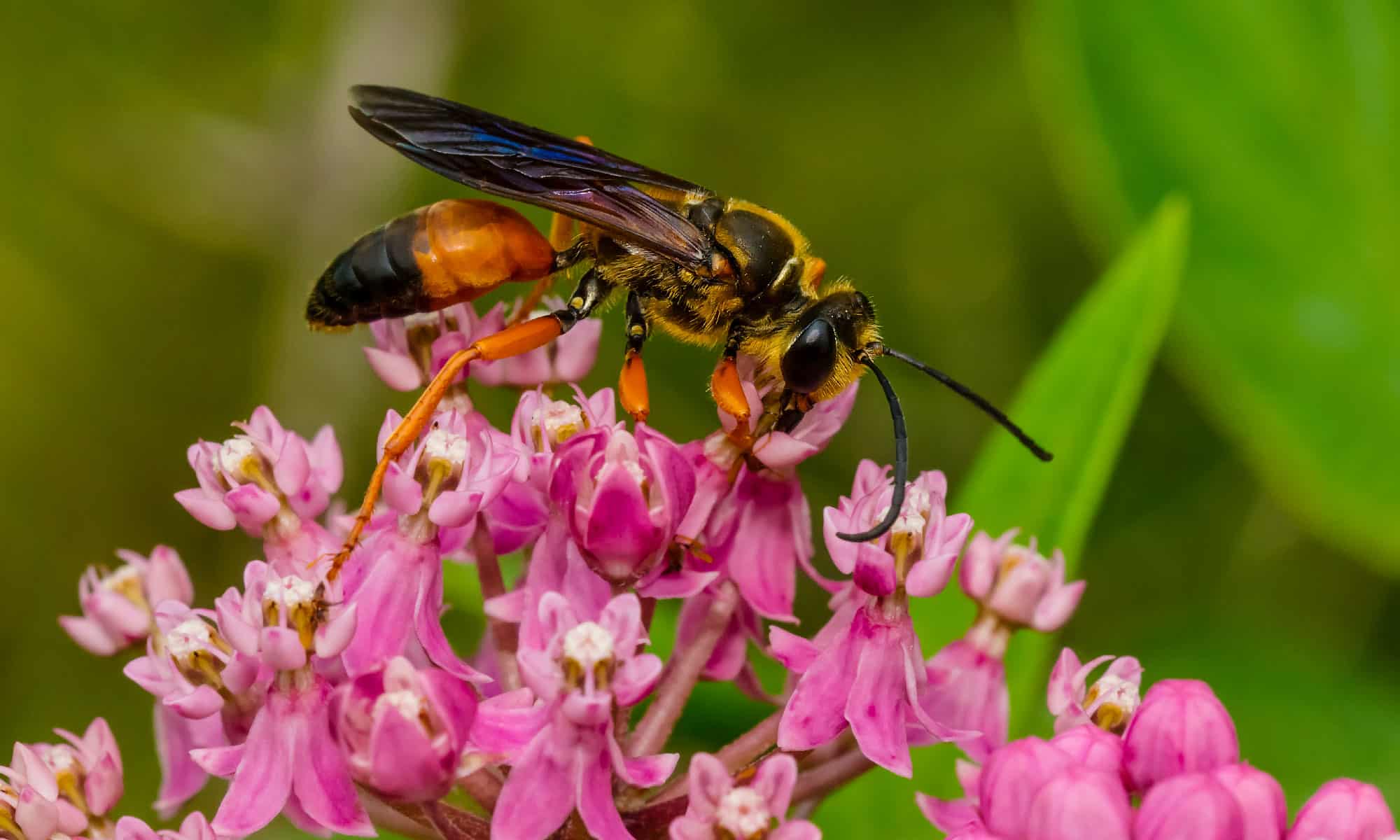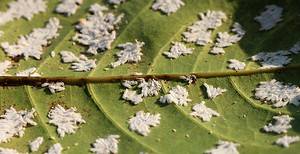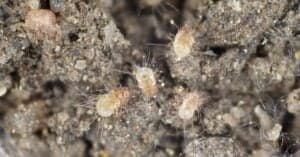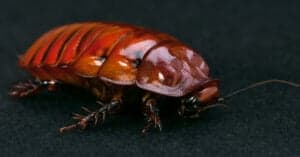Welcome to our blog, where we delve into the intriguing world of smells that attract wasps! In this article, we will explore seven distinctive smells that have a peculiar allure for these buzzing insects. Whether you are looking to gain a deeper understanding of wasps or seeking ways to navigate their presence, this comprehensive guide is designed to shed light on the scents that captivate their attention. We will uncover natural substances and common household items known for effectively luring wasps. From fruity fragrances that mimic ripe fruits and flowers to savory aromas reminiscent of decaying organic matter. Through this, we can better coexist with these fascinating creatures while ensuring our own comfort and safety.
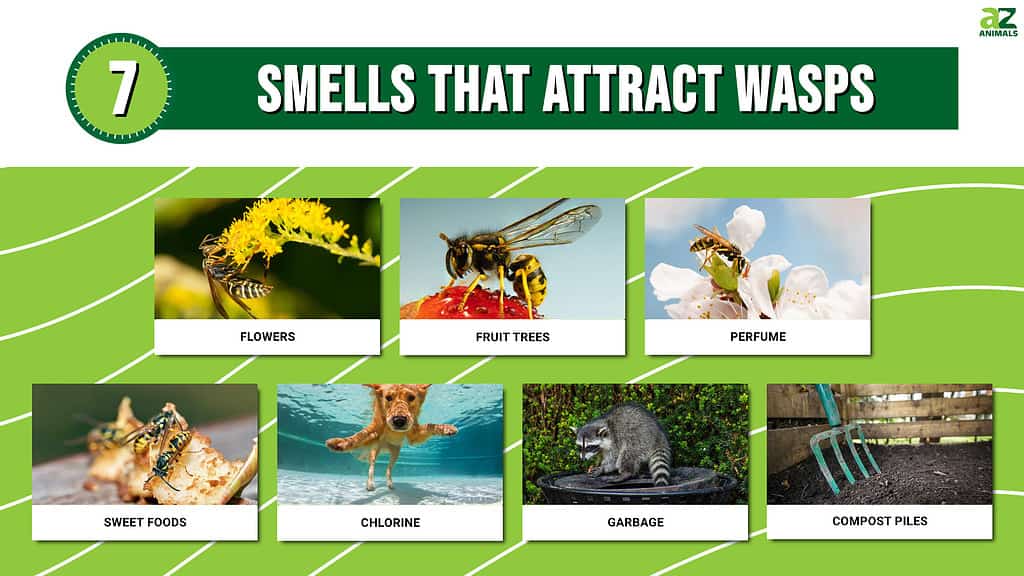
How Are Wasps Beneficial?
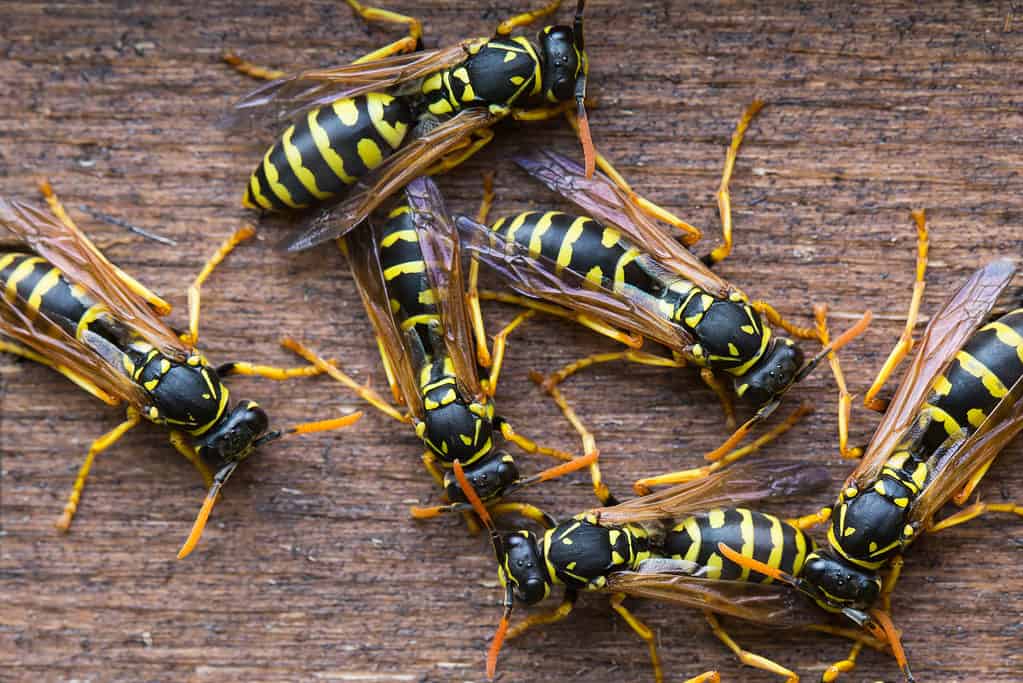
Did you know that wasps are attracted to chlorinated pools?
©FCerez/Shutterstock.com
Wasps, with their impressive diversity of species numbering around 100,000, play a crucial role in maintaining balance within ecosystems. Among these species, approximately 70,000 are parasitic wasps known for their voracious predatory nature when it comes to pest insects. Their invaluable ability to control and regulate populations of harmful pests makes them highly sought-after allies in the realm of agriculture.
In farming practices across various regions, including Brazil, wasps have emerged as reliable partners in pest management. This means farmers don’t have to resort to chemical insecticides. For instance, by effectively controlling borer moths that wreak havoc on sugar cane crops. And by eating fall armyworms that pose threats to maize cultivation. These industrious insects contribute significantly towards saving farms an astonishing $400 billion dollars annually.
Beyond their predatory prowess lies another remarkable aspect of wasp biology. They produce powerful antibiotics found within their venom. This venom carries a potent cocktail capable of paralyzing its prey while also containing abundant amounts of antibiotics. Some solitary wasps even go as far as burying their eggs alongside paralyzed prey. This ensures a well-preserved food source once the offspring hatch. Traditional medicine has long recognized and utilized the antimicrobial properties present in wasp venom.
Aside from managing pest populations, these resourceful creatures actively participate in pollination processes as well. Astonishingly versatile when it comes to plant interaction, wasps visit over 950 different types of plants. 165 of those plants are dependent on wasps for pollination!
In many areas of the world, wasps, particularly their larvae, are part of the diet. People eat wasps in Japan, India, and Venezuela.
Smells That Attract Wasps
Wasps are attracted to sweet smells, so many types of flowers and fruits attract them. They are also attracted to sugar, compost piles, and bright colors (especially yellow and green).
Flowers
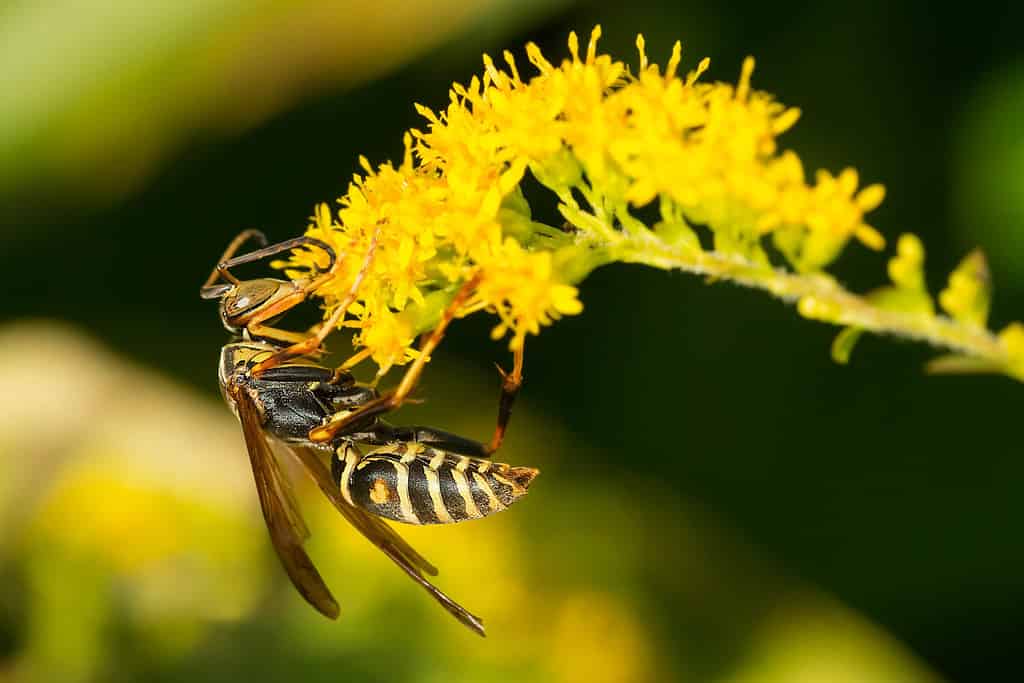
Most people don’t realize that wasps are the primary pollinators for many types of plants.
©Paul Reeves Photography/Shutterstock.com
Wasps have a keen eye for color, and they are particularly attracted to brightly colored flowers. This is because these flowers have evolved to attract these insects as a way of ensuring their pollination. Wasps are drawn to the vibrant hues of these flowers, as they are a sign of a reliable food source.
In addition, the bright colors of these flowers also make them easier to locate. Wasps have poor eyesight, so the bright colors allow them to easily spot the flowers from a distance. This makes it easier for them to locate a food source.
Overall, wasps are attracted to brightly colored flowers for a variety of reasons. They see flowers as a reliable food source that is easy to locate.
Fruit Trees
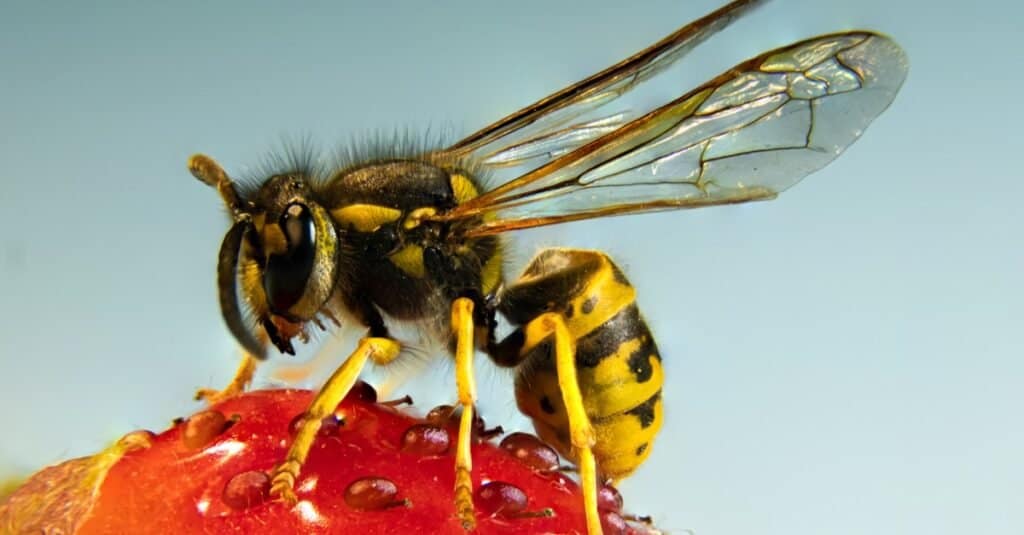
There is nothing a wasp loves more than fruit that is overripe and rotting on the ground. Delicious!
©Thomas Hochreutener/Shutterstock.com
Wasps are known to be attracted to fruit trees due to the sweet and juicy scent emitted by ripening fruits. These insects have a keen sense of smell. They can detect the aroma from afar and are naturally drawn towards it. The sugary fragrance acts as a powerful lure for wasps seeking nourishment, particularly during the warmer months when fruits ripen.
Homeowners should make it a priority to promptly pick up fallen fruit from their yards instead of letting it rot on the ground. This is crucial because decaying or overripe fruits create an ideal feeding ground for wasps. When left unattended, fallen fruits release an even stronger scent that attracts more wasps. It also provides them with an abundant food source. Consequently, this can lead to increased wasp activity around residential areas. Potentially posing a nuisance or health risk to individuals who may have allergies or fear of stings.
Regularly removing fallen fruit from the vicinity of fruit trees is important. Homeowners can help minimize both the presence and attraction of wasps in their surroundings. Proper disposal methods such as composting or discarding in sealed containers can further ensure that these discarded fruits do not become breeding grounds for other pests as well.
Perfume
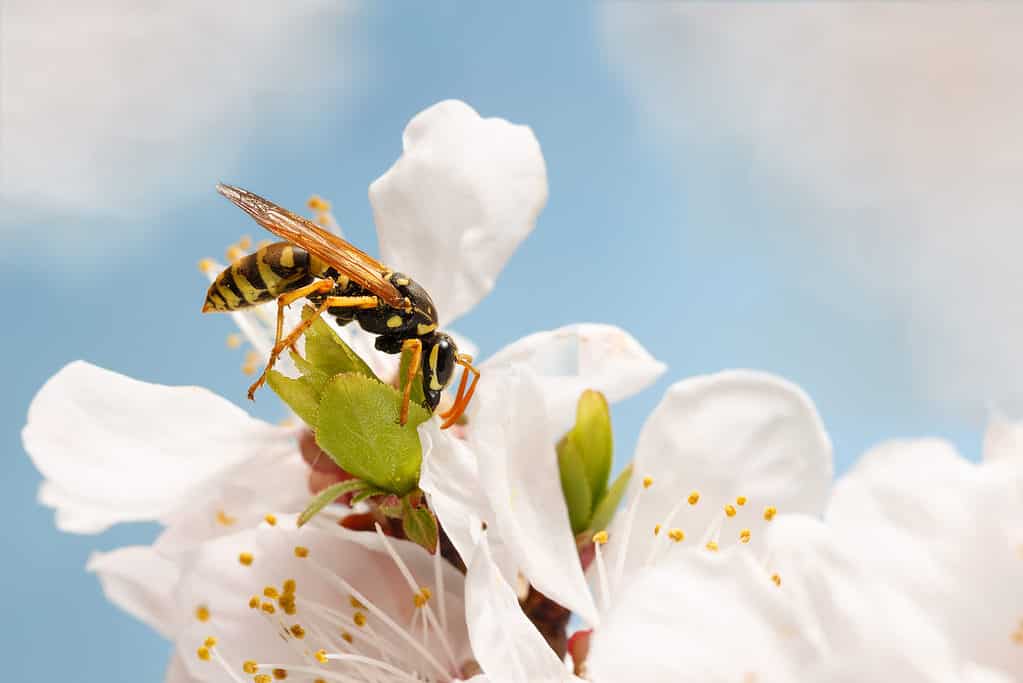
Perfume is known to attract wasps, especially floral scents.
©iStock.com/tenra
Wasps are known to be attracted to perfume due to their strong sense of smell. Perfumes often contain floral or fruity scents, which can mimic the natural aromas that attract wasps in nature. These insects are naturally drawn to nectar from flowers and ripe fruits. They serve as a source of food for them.
The sweet and aromatic notes present in perfumes can easily confuse wasps. This leads them to believe that there is a potential food source nearby. Additionally, certain ingredients commonly found in perfumes, such as vanilla or honey, may further enhance their attraction toward these fragrances.
However, not all scents have the same effect on wasps. While some fragrances might lure them in, others can effectively deter their presence. People who wish to avoid attracting wasps should opt for scents that repel these insects instead.
Citrus-based perfumes or essential oils like lemon or orange tend to act as natural repellents against wasps due to their strong and pungent aroma. Wasps find these citrusy smells unpleasant and will generally steer clear of areas where such scents prevail.
Moreover, herbal scents like mint or eucalyptus also possess insect-repelling properties. They can help prevent unwanted encounters with wasps when incorporated into perfumes or body sprays.
By understanding why certain scents attract wasps while others deter them, individuals can make informed choices about the fragrances they wear. This will minimize the likelihood of encountering these stinging insects during outdoor activities.
Sweet Foods
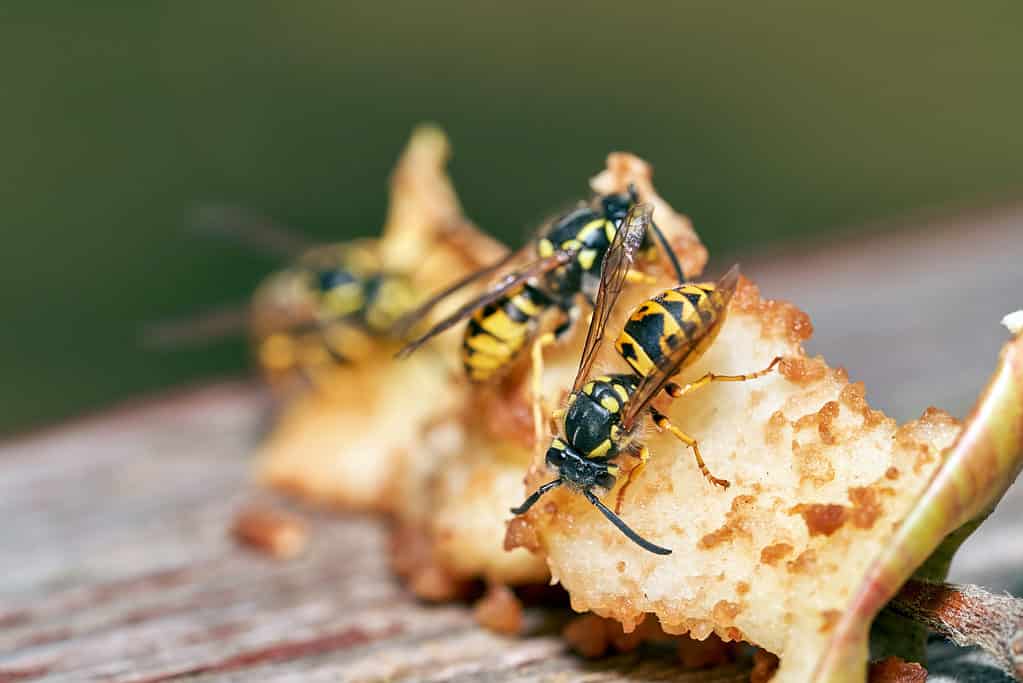
In late summer, when nectar is more scarce, wasps really crave sugary sweet foods.
©Jonas Vegele/Shutterstock.com
Wasps are highly attracted to sweet and sugary foods due to their natural feeding habits and preferences. These flying insects have a keen sense of smell. This enables them to detect the presence of sugars and carbohydrates from a considerable distance away. Sweet substances such as fruits, nectar, honey, soda, and even sugary desserts emit volatile compounds that act as powerful attractants for wasps.
The reason behind this attraction lies in the fact that wasps primarily feed on carbohydrates during certain stages of their life cycle. Adult wasps consume nectar from flowers as it provides them with essential energy sources like glucose. However, when searching for food to nourish their larvae or themselves during late summer or early autumn months when flowers become scarce, they turn towards alternative sugar-rich food sources.
For people who enjoy dining outdoors or having picnics, preventing wasp encounters can be crucial in ensuring a pleasant experience. There are several measures individuals can take to reduce the likelihood of attracting these buzzing insects. Firstly, keeping all food containers tightly sealed is essential. Exposed sweet items will undoubtedly grab the attention of hungry wasps nearby.
Additionally, placing food inside covered containers or using mesh screens over dishes can provide an extra layer of protection against unwanted visitors. It’s also advisable to keep garbage cans securely closed at all times and dispose of any waste properly after meals since residual odors may still attract curious wasps.
Chlorine
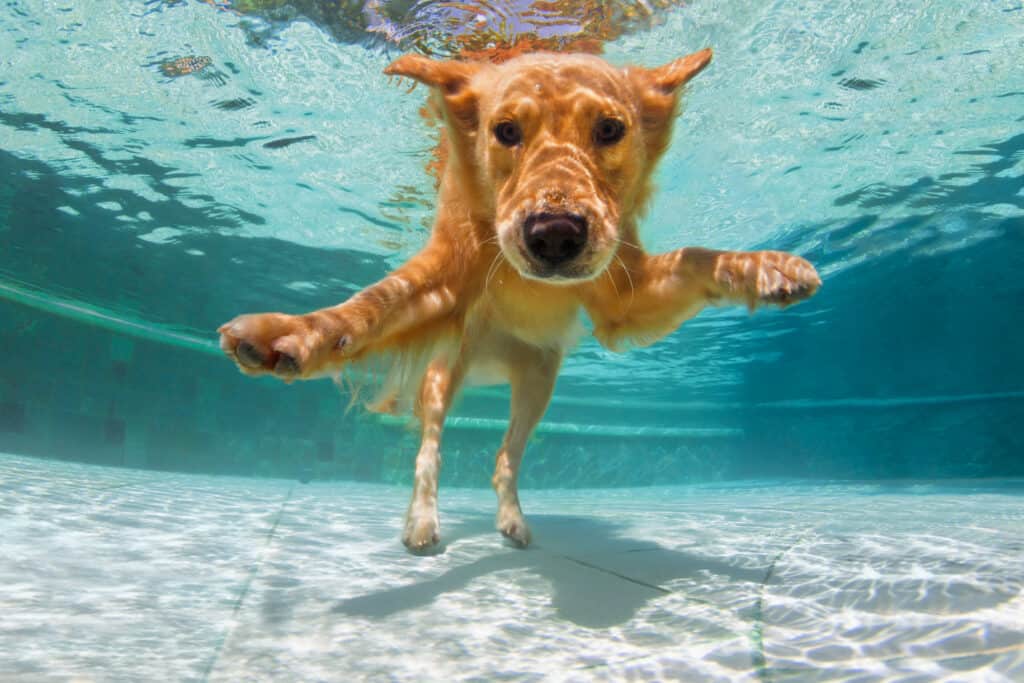
Chlorine attracts wasps because of its chemical smell.
©Denis Moskvinov/Shutterstock.com
Wasps have an incredibly sensitive sense of smell. They are naturally inclined to seek out bodies of water that emit strong odors. Among these enticing scents, the distinct aroma of chlorine often proves irresistible to these buzzing insects. Chlorine is a common chemical that people use in pool maintenance, renowned for its ability to sanitize and disinfect water. While it effectively keeps pools clean and safe for human use, it unintentionally emits odors that attract the attention of curious wasps.
The pungent odor emitted by chlorine-treated pool water acts as a magnet for wasps, drawing them towards swimming pools like eager visitors enticed by an alluring fragrance. This phenomenon can pose challenges for those seeking tranquility while enjoying their backyard oasis or public aquatic facilities during warm summer months. However, understanding this peculiar attraction can help individuals take precautionary measures to mitigate potential encounters with these buzzing creatures.
Garbage
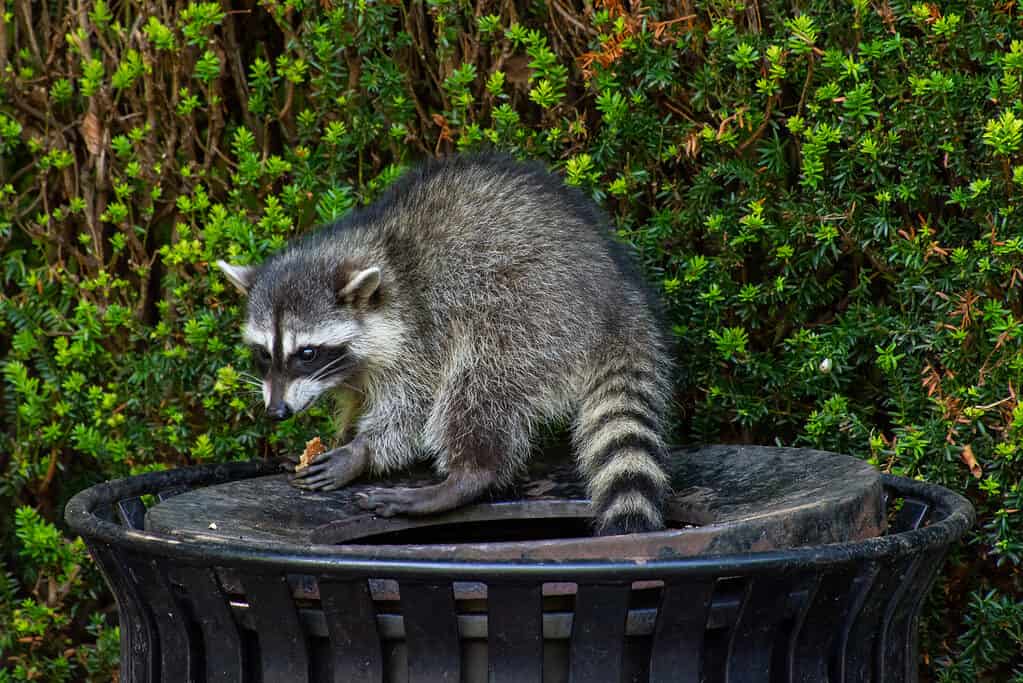
Who will get to the garbage cans first, raccoons or wasps?
©kingma photos/Shutterstock.com
Garbage cans, with their enticing odors of decaying organic matter, serve as a haven for an array of pests, and wasps are no exception. Despite our aversion to day-old meat and other discarded food items, these resilient insects have no qualms about indulging in them. Moreover, it is not just the edible scraps that attract wasps. They are also drawn to the various insects that find their way into our garbage cans.
Interestingly enough, while we may view wasps as mere nuisances or potential threats due to their stinging capabilities, it is important to recognize their vital role in maintaining ecological balance. Acting as natural pest control agents within the ecosystem, wasps diligently fulfill their purpose by feasting on the very insects that infest our trash receptacles.
By devouring these unwanted guests from your garbage can, wasps contribute significantly to insect population regulation. Their insatiable appetite for insect prey helps keep pesky creatures at bay and minimizes potential outbreaks or infestations around your home. By doing so, they inadvertently assist in preserving both human health and environmental equilibrium.
Compost Piles
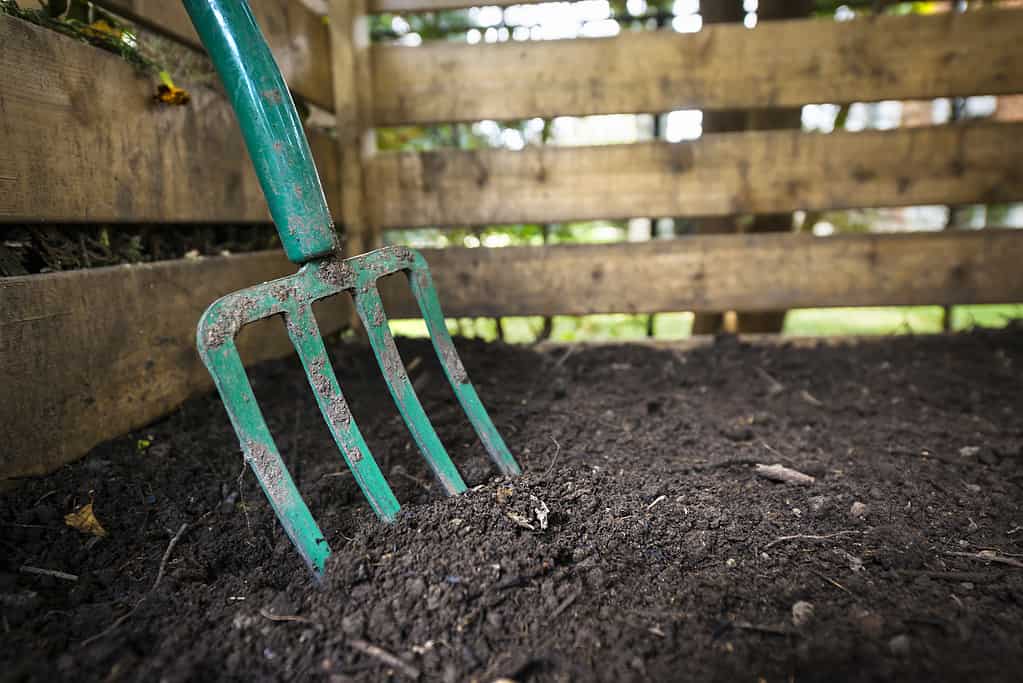
Keep your compost piles turned often and moist to deter wasps.
©Elena Elisseeva/Shutterstock.com
Compost piles can be a haven for wasps, particularly when decaying fruit waste is present. These buzzing insects have an insatiable craving for sugar, especially during the later months of summer. To keep these pesky creatures at bay, people can maintain a compost pile that is regularly turned and kept moist and active.
Wasps are drawn to compost bins primarily due to the abundance of decaying fruit waste. As fruits break down and release their natural sugars, they emit an irresistible aroma that acts as a magnet for these winged pests. Therefore, if you wish to minimize the presence of wasps in your compost area, it’s crucial to address this particular attraction.
In addition to consistent turning, maintaining proper moisture levels in your compost heap plays a vital role in repelling wasps. Wasps prefer dry environments for building nests. Therefore, keeping your compost pile adequately damp discourages them from considering it as an ideal breeding site or food source.
Summary of 7 Smells that Attract Wasps
| Number | Smell | Description |
|---|---|---|
| 1 | Flowers | Wasps are attracted to brightly colored flowers as they see them as a reliable and easy-to-locate food source. |
| 2 | Fruit Trees | The sweet and juicy scent emitted by ripening fruits attracts wasps. Decaying or overripe fruits create an ideal feeding ground for wasps. |
| 3 | Perfume | Perfumes often contain floral or fruity scents, which can mimic the natural aromas that attract wasps in nature. |
| 4 | Sweet Foods | Wasps are highly attracted to sweet and sugary foods due to their natural feeding habits and preferences. |
| 5 | Chlorine | The distinct aroma of chlorine often proves irresistible to wasps, drawing them towards swimming pools. |
| 6 | Garbage | Garbage cans, with their enticing odors of decaying organic matter, serve as a haven for wasps. |
| 7 | Compost Piles | Compost piles can be a haven for wasps, particularly when decaying fruit waste is present. |
Thank you for reading! Have some feedback for us? Contact the AZ Animals editorial team.

